It’s time for an African–American film to win the Oscar for Best Picture. The universally coveted award has been facing serious backlash in recent years for its homogeneity, as #OscarsSoWhite so succinctly puts it. Two extraordinarily powerful African–American films have made it to the nominations shortlist this year. BlacKkKlansman and Black Panther sent out shockwaves throughout the country upon their releases. The two are both groundbreaking films, but here’s why BlacKkKlansman should get the Oscar over Black Panther.
BlacKkKlansman, directed by Spike Lee and produced by Jordan Peele, is based on the true story of a black cop, Ron Stallworth (John David Washington), infiltrating the Ku Klux Klan. In the 1970s, he dealt with racism from his fellow cops, but it was nothing compared to the hatred he witnessed in the terrorist organization of the KKK. The filmmakers let the audience see the KKK in action, so that they may observe the crazed hatred that drives them to burn crosses and plan bombings. These images are juxtaposed against displays of black power. Black students gather to hear Kwame Ture speak about self–empowerment and about rallies to fight against racism. The contrast of hate and love is striking.
BlacKkKlansman touches on themes of double consciousness and the systematization of racism. The idea of double consciousness—a term coined by W. E. B. Dubois for the two warring identities of being Black and being American—is especially appropriate for Stallworth. In fact, he deals with a kind of triple consciousness: how can he reconcile his position as a policeman, so often reviled for their outright racism and police brutality, with his identity as a Black American man? His girlfriend Patrice (Laura Harrier), the president of the Black Student Union, thinks that he cannot. Racism is, for her, everywhere and all the time. But Stallworth doesn’t see it that way. Indeed, he hardly seems to see the systematization of racism at all—and here is where the film really gets good. It compels the audience to question whether they, too, are asleep. Stallworth can’t believe that the KKK leader David Duke (Topher Grace) could run for—and potentially win—public office. His fellow officer tells him he needs to wake up. When an FBI agent asks for two of his suspects, Stallworth asks if the FBI can help with his investigation of the KKK. It’s as if he’s not aware that the Bureau was led by J. Edgar Hoover, who fought to shut down the Civil Rights Movement and blackmailed Martin Luther King Jr. to resign. Patrice periodically gets frustrated with his naivete, and tells him he needs to wake up, mirroring the audience's frustration.
The filmmakers capitalize on the idea of “waking up” with the timely footage of the 2017 “Unite the Right” white supremacist rally in Charlottesville, Va. Stallworth’s story is from the 1970s. He had trouble seeing the systematic racism around him in a period that we look back on as quite obviously racist. But he would have trouble waking up today, too, in a period that many tend to view as progressive and politically correct. The footage of the “Unite the Right” rally is a terrible reminder of the hate that still exists today. In the follow–up of this footage, President Donald Trump condones the rally when he says, “You had a group on one side that was bad, and you had a group on the other side that was also very violent … You also had people [in the rally] that were very fine people.” We see David Duke himself say that Charlottesville is the first step towards Trump’s allusion of taking America back—to Make America Great Again. That’s the most jarring part of the footage. Remember when Stallworth thought, in the 1970s, that it was impossible for someone like Duke to attain public office? This connection to the present is what makes this movie so incredible.
Stallworth may not understand how deeply racism is embedded in the US in BlacKkKlansman, but Black Panther takes it as a given. The question is, rather, what can be done about it. The film proposes that there are two possible answers. There is the Wakandan response, which maintains a position of non–violence. And there is the response of self–defense, where weapons are distributed to oppressed groups to fight their oppressors. It’s a valid discourse—it actually represents the moral question that was raised in the Civil Rights Movement of the 1960s. Should those against racism protest non-violently, as MLK Jr. believed? Or should they fight back, as Malcolm X and the Black Panther Party proposed? The film puts forth these questions to let the audience decide, but they take it too far. By assigning the slogan of self–defense to an overly violent and dictatorial villain, they inherently undermine the theory. He kills his girlfriend because she stands in his way, kills his partner for self–gain, and consolidates his power by burning all of the “heart–shaped herbs” that give Wakandan kings the power of the superhero Black Panther. This exaggeration invalidates the villain’s otherwise potentially sound ideas. Instead, the film seems to promote the vague idea that “aid” will help. It ends with the Black Panther setting up the “Wakandan International Outreach Center.” But what does that mean? How does charity fight the more systematic issues? Sure, it’s just a superhero movie that’s not meant to answer these kinds of questions, but should it be dismantling the position that the actual Black Panthers championed?
BlacKkKlansman and Black Panther are both milestones in cinema. Their skillful cinematographies emphasize their messages of black power. The only disappointment is in Black Panther, in which they ironically seem to invalidate some of the ideas of the historic Black Panthers.
In honor of Black History Month, let’s see BlacKkKlansman break the mold and win the Oscar for Best Picture.

